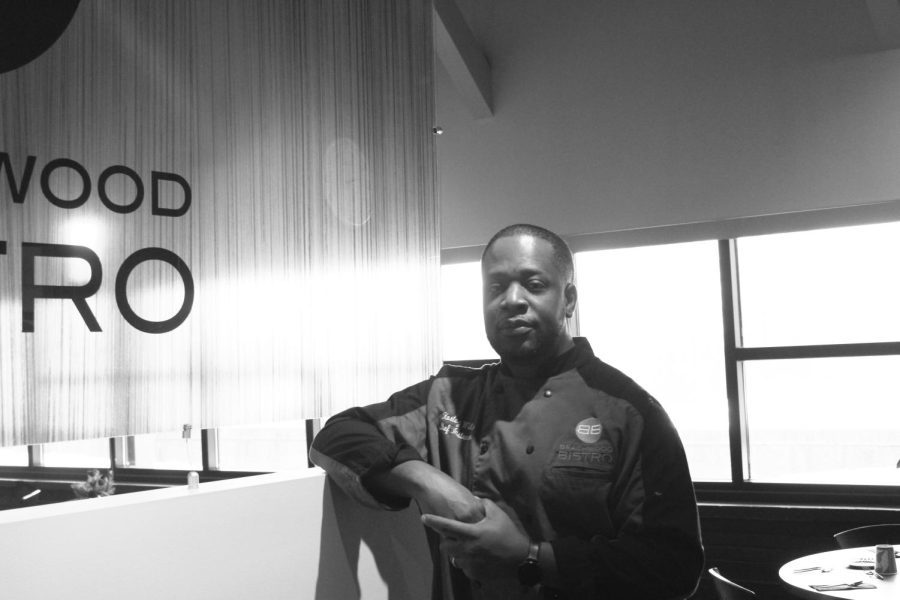How Cuisine Reveals History and Builds Community
Beachcomber Archives / Hiba Ali
“We look forward to the point where we literally could just hand the kids the keys to the restaurant,” Chef Wilson said.
Many stories can be told through cuisine. Pizza, which was first made by lower class Italians in impoverished times since the ingredients were cheap, or the true tale of Ratatouille, made by poor French farmers who needed to use leftover crops. This is no less true in America, where much of our country’s life is revealed through the food we eat.
“Food has a great significance in history, when you think back over the course of time and trade, food has influenced everything from economic to cultural influences in different societies,” culinary arts instructor Chef Kortez Wilson said.
He points to the wide range of cuisines in the United States as an example.
“When you look at different regions: Texas and Arizona and the influences of Mexico,” he said. “When you look at Louisiana, look at the influence of French cuisine.”
Cleveland’s own food scene has fluctuated with different time periods: the end of World War II saw a surge in Clevelanders going out to eat; from 1930-1950, the city saw the numbers of restaurants grow as a result of conventions; ethnic enclaves such as Little Italy and Asiatown have developed with each new wave of immigration.
Immigration also brought forth one of Cleveland’s oldest restaurants: Guarino opened in 1918 on 12309 Mayfield Road in Little Italy.
“Food is communal,” social studies teacher Kathryn-Anne Barney said. “It’s how people express their love for one another and care for one another, and people put their whole heart in the food.”
“Food [helps people stay connected with their] origins when they move to different places,” she added.
Roots in Slavery
“When we look at American soul food, that has roots in the African American community, but the staple and key ingredients, like the spice and flavors… were brought over from Africa,” Barney said. “It’s like a conglomeration of ingredients and recipes… It’s also a way to show appreciation and love for one another.”
Enslaved people were given leftovers. Instead of eating second-rate food, they would adapt traditional recipes to make a true meal, and from that developed soul food: biscuits, fried fish, grits, cornbread and collard greens.
Many enslaved cooks also had to learn to cook new meals when travelling abroad, for example, when Thomas Jefferson went to France, his cook, James Hemmings, had to learn to make ice cream, french fries and other recipes so the family could eat them in America.
“[Food] can also tell a story of trials and tribulation,” Barney said. “One key cuisine that [African Americans] have… is chitlins (made from pig intestines)… Because of slavery, people in bondage were given scraps. We made it a cuisine, and now we eat it regularly, but it was given in bondage.”
Great American Melting Pot
A lot of American food culture is a result of immigration.
“There’s a wealth of knowledge, not really hidden but embedded in every culture when it comes to knowledge of how to prepare different items,” Wilson said.
In the 19th and early 20th centuries, there was a rise in nativist sentiment that led many white Americans to embrace xenophobia and reject the immigrants coming into the country. In fact, this sentiment bled into the government, and with the Immigration Act of 1924, many Asians were barred from entering the country.
One of the exceptions to these laws was that, if one had a merchant visa one could enter the country. In 1915, restaurants were added to the list of approved businesses. One of the stipulations was to have two white witnesses to support a visa, so many Chinese restaurant owners would ask nearby vendors to serve as witnesses.
Due to this pathway to enter the country, the number of Chinese restaurants doubled between 1910 and 1920, and by 1930, the number doubled again.
Historically, Beachwood has had a large Jewish population. Many Jewish people keep kosher, and it can be hard to find restaurants that are certified as following the dietary requirements.
Several kosher restaurants serve the local Jewish community, including Issi’s Place, located at 14431 Cedar Road in South Euclid. It mostly sells pizza but also serves pasta, falafel and other Mediterranean dishes.
“[We] serve kosher pizza, [we] provide a service for the Jewish community,” said Cindy Ashwal, Office Manager.
“It’s like a staple of [the Jewish] community now, everyone goes… we have an established presence [in the community],” said senior Rafi Rubeck, who works at the restaurant.
Another restaurant feeding Beachwood is Ho Wah on 2102 Richmond Road, which has served Cantonese cuisine for 43 years.
“The most important thing is that we have good will and good relationships with the citizens of Beachwood and South Euclid,” General Manager Edward Hom said. “They are the ones who have supported us. They have enjoyed our food and they have been regular customers for 43 years.”
Political Conflicts
Our names for food can be highly politicized. For example, in 2003, when tensions between America and France were on the rise because of political tension over France opposing America’s policy in Iraq, some Americans changed names of food like French Fries and French Toast to Freedom Fries and Freedom Toast. It should be noted that French Fries originated in Belgium.
It was more than just a few restaurants that changed their menus (the trend originated in North Carolina). The name for fries was also changed in the cafeteria of the U.S. House of Representatives.
During World War I, names of German dishes were altered because the war fueled anti-German sentiments. Some name changes include hamburger to salisbury steak and frankfurter to hot dogs and even sauerkraut to liberty cabbage.
Benefits of Restaurant Diversity
Beachwood also has a lot of diversity, and with that comes diversity in cuisine.
“Looking at students I’ve seen over the past 15 years, [Beachwood is] very diverse,” Wilson said. “I think that it’s changed, obviously, from my first year teaching to now. It’s more diverse than it’s ever been.”
Wilson asks his students to share their own diverse cuisines.
“Every year I make sure to capitalize on [the diversity] by giving assignments to students to share an authentic cuisine from their culture with the class,” he said. “It’s absolutely fantastic just to hear the excitement from each student in the beginning of the school year, just to share who they are, and not just who they are, but what their culture is, it really opens up opportunities for discussion and questions and understanding.”
Restaurant diversity is important to communities because they not only make immigrants feel more at home and provide job opportunities, but also fight against ignorance and make unity more possible by making a community’s culture richer and more inclusive.
A local example of a restaurant that provides a service to a minority community is Cleaveland Grocers and Grill, 13425 Snow Road in Brook Park. This business is Muslim-owned and was established to meet the need for halal meat in Ohio.
This restaurant serves meals including burgers and pizza fries, and the shop sells imported goods. It is also the only food vendor in Ohio certified by the Halal Foods Standards Alliance of America.
“We’re the only one in all of Cleveland that serves halal meat,” said co-owner Fasih Syed. “We’ve brought something new to the Desi (refers to the cultures in Southeast Asia) community. Now people have the option to come to us.”
“I think having a place where we all have something in common and have a place to celebrate that is good,” Freshman Anah Khan said. “You can barely tell you’re in Cleveland.”
Diverse restaurants add a lot to communities, but authenticity is also important.
“Look at the things that we eat in the African American community, and how they’ve been appropriated,” Barney said. “Paula Deen, that’s a white lady, but she’s making a lot of money out of soul food. Do you think she’s giving that money back to the Black community?”
Local Restaurants and the Pandemic
Issi’s Place, like many restaurants, had to shut down initially during the pandemic. However, they made a case to the Cleveland Board of Health and were allowed to open up due to their service to the Jewish community.
While they did open up again, it was a struggle since there was so much uncertainty about the virus. But thanks to the support from the community, they are on their feet again, according to Ashwal.
The staff at Ho Wah are passionate about their mission. Even though servers were impacted badly due to the pandemic, the restaurant still did a brisk business.
Cleaveland Grocers and Grill opened during the pandemic, so their owners can’t speak to how it would have affected their business; however, they received much support, with their customer base stretching beyond the Muslim community.
Bangkok Thai on 5359 Mayfield Road in Lyndhurst is another restaurant enjoyed by Beachwood residents. It’s also a family-owned restaurant with employees motivated to feed the hungry with healthy food. Sadly, they lost a lot of employees to bigger businesses, such as Amazon, during the pandemic.
“[We] think that good customer service is very important… and food is also important,” said an employee answering the phone at Bangkok Thai.

Hiba Z. Ali began writing for the Beachcomber in fall of 2019. She covers diversity in the school. In addition to writing for the Beachcomber, she also...













